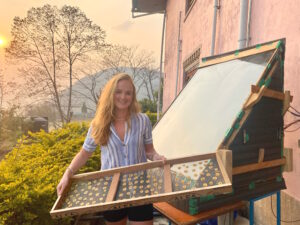In February 2024, I went on an incredible journey to Bhutan to conduct research for my master’s thesis on solar drying technologies at Lund University Faculty of Engineering. My time there was not only a fantastic learning opportunity but also a deeply personal and inspiring experience. I met so many great people and made the most wonderful memories I am incredibly grateful for.
From the moment I arrived in Bhutan, I was met with warmth and hospitality. The Bhutanese people’s kindness made me feel at home instantly. A few days after my arrival, the celebrations for the king’s birthday took place. The events gave a vivid introduction to Bhutanese culture. Seeing people dressed in traditional attire (Kira and Gho), and even wearing it myself, was both colorful and captivating. These celebrations, filled with joy and community spirit, offered a glimpse into the traditions that seem to bind the Bhutanese people together.
My research aimed to address a critical issue in Bhutan: food preservation. In rural areas, limited access to electricity and challenging road infrastructure make it difficult for farmers to preserve their produce. Solar drying, which harnesses the power of the sun to dehydrate fruits and vegetables, presents a sustainable solution to this problem. My focus was to explore the effectiveness of solar drying technologies and their applicability in Bhutan’s unique context.
The data collection for my research was conducted at Jigme Namgyel Engineering College (JNEC) in Dewathang, located in southeastern Bhutan. Through numerous experiments, I assessed the performance of different solar dryer configurations, paying close attention to airflow and heat distribution to ensure even drying. My experiments focused on drying bananas and chilies, two crops of significant importance to local farmers.
Beyond the technical aspects of my research, I wanted to immersed myself in Bhutanese culture as much as possible. Attending pujas at local temples allowed me to experience Buddhism, the predominant religion in Bhutan, firsthand. I found the spiritual practices to be incredibly welcoming, with locals eager to share their beliefs and customs. These interactions taught me so much about Bhutanese society and really made me appreciate their values and way of life. I also got to join many of the students’ gatherings and everyone was super excited to let me try their homemade (super spicy!) dishes and drinks.
Conducting field experiments in a remote setting posed several challenges such as equipment limitations and the manual nature of some data collection processes. However, the Bhutanese people’s ingenuity in finding creative solutions was truly inspiring. Their resourcefulness and adaptability taught me valuable and very practical lessons in problem-solving.
My time in Bhutan was special in so many ways. I had never worked on such a practical, locally impactful and fun project. I learned so much in the process, not only for my academic pursuits but also on a personal level. The experience of living and working in such a unique and beautiful country deepened my understanding of the interconnectedness of cultural and environmental sustainability.
In conclusion, my journey to Bhutan was an extraordinary blend of research and cultural immersion. As I continue my academic and professional journey, the lessons learned and memories made in Bhutan will undoubtedly guide and inspire me forever.

